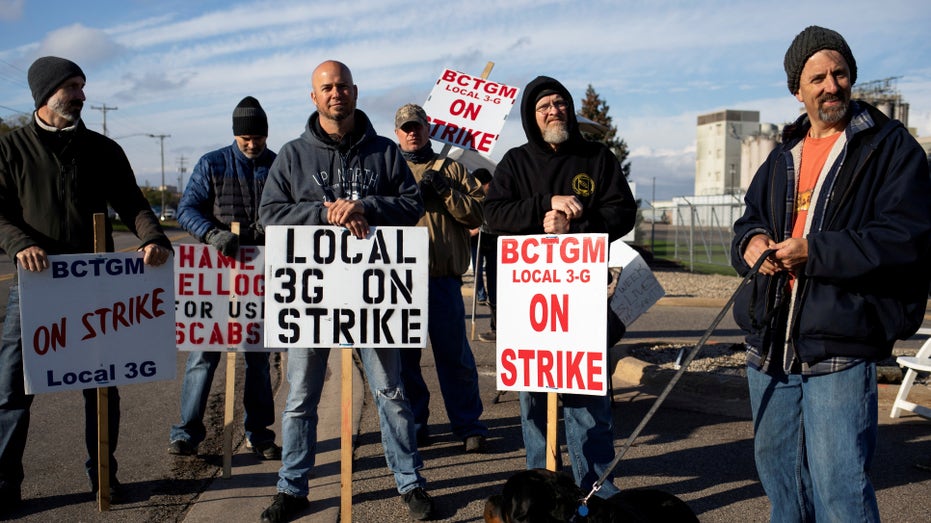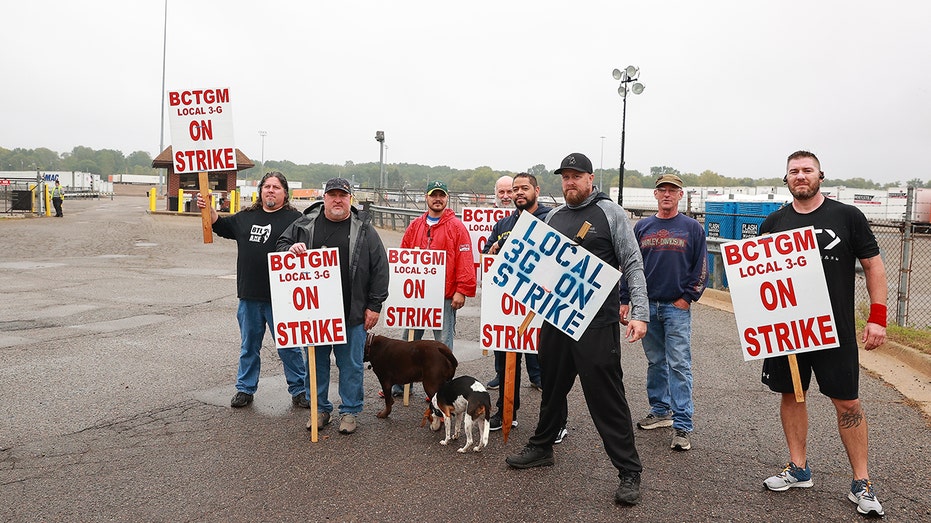Kellogg's union employees to end strike on wage hike
Agreement includes cost-of-living adjustments, $1.10- per-hour raise
Famous chef Lidia Bastianich talks food prices, PBS special
Restauranteur Lidia Bastianich on the impact of inflation and her new PBS special 'Overcoming the Odds' that brings American's from all-walks of life together with food.
Kellogg's union employees have voted to ratify a tentative labor contract Tuesday, marking an end to a strike that began Oct. 5.
| Ticker | Security | Last | Change | Change % |
|---|---|---|---|---|
| K | NO DATA AVAILABLE | - | - | - |
The five-year agreement covers approximately 1,400 workers at its Battle Creek, Michigan; Omaha, Nebraska; Lancaster, Pennsylvania; and Memphis, Tennessee, plants who are represented by the Bakery, Confectionary, Tobacco Workers and Grain Millers (BCTGM) International Union.

First shift worker Travis Huffman joins other BCTGM Local 3G union members in a strike against Kellogg Co. at the Kellogg's plant on Porter Street in Battle Creek, Michigan, on Oct. 5, 2021. (Alyssa Keown/Battle Creek Enquirer/USA Today Network via REUTERS / Reuters Photos)
The workers make the company’s well-known brands of cereal, including Apple Jacks and Frosted Flakes.
STARBUCKS TO NEGOTIATE ‘IN GOOD FAITH’ WITH BUFFALO UNION WORKERS
Kellogg said the contract provides "immediate, across the board wage increases and enhanced benefits for all." It also provides an accelerated, defined path to top-tier wages and benefits for transitional employees. Employees will return to work the week of Dec. 27.
"We are pleased that we have reached an agreement that brings our cereal employees back to work," CEO Steve Cahillane said in a statement. "We look forward to their return and continuing to produce our beloved cereal brands for our customers and consumers."
BCTGM International President Anthony Shelton emphasized that the agreement "makes gains and does not include any concessions." Highlights of the agreement include cost-of-living adjustments, a $1.10-per-hour raise for all employees, a moratorium on plant shutdowns through October 2026 and no permanent two-tier system.
"Our entire Union commends and thanks Kellogg’s members," Shelton said. "From picket line to picket line, Kellogg’s union members stood strong and undeterred in this fight, inspiring generations of workers across the globe, who were energized by their tremendous show of bravery as they stood up to fight and never once backed down."
GET FOX BUSINESS ON THE GO BY CLICKING HERE
The resolution comes after an overwhelming majority of workers voted down a five-year offer earlier this month that would have provided 3% raises and cost-of-living adjustments in the later years of the deal to most but not all of the workers. That offer also would have preserved employees' current health benefits.

A group of union workers from Kellogg's picket outside the cereal maker's headquarters as they remain on strike in Battle Creek, Michigan, on Oct. 21, 2021. (REUTERS/Emily Elconin/File Photo / Reuters Photos)
Kellogg’s said most workers at its cereal plants earned an average of $120,000 last year, though union members have said they work more than 80 hours a week to earn that, and those wages are only available to longtime workers. Under the two-tiered pay system the company uses, newer workers are paid less and receive fewer benefits.
That pay system has been a sticking point during the negotiations, and Kellogg’s offer didn’t change on that part of the contract. The company has said it will allow all workers with at least four years of experience to move up to the higher legacy pay level as part of this contract. Union officials previously said that plan wouldn’t let other workers move up quickly enough. The company has also proposed eliminating the current 30% cap on the number of workers at each plant who receive the lower wages.
CLICK HERE TO READ MORE ON FOX BUSINESS
The workers remained unified during the strike amid worker shortages across the country, which may have given them more leverage in negotiations. And they said raises were overdue after workers kept the plants running throughout the coronavirus pandemic.

Kellogg's cereal plant workers demonstrate in front of the plant on Oct. 7, 2021, in Battle Creek, Michigan. (Photo by Rey Del Rio/Getty Images / Getty Images)
Throughout the strike, Kellogg’s has been trying to keep its plants operating with salaried employees and outside workers, and the company said late last month that it planned to start hiring permanent replacements for the striking workers. President Biden sharply criticized Kellogg’s for threatening to permanently replace workers, saying that doing that would undermine the collective bargaining process.
Kellogg's shares have fallen more than 2% during Tuesday's trading session.
The Associated Press contributed to this report





















